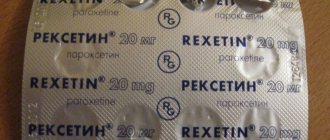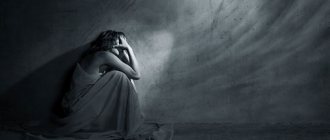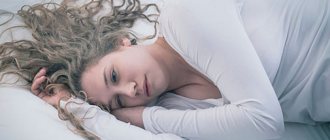Often a depressed mood is accompanied by feelings such as unexplained anxiety and despondency. Some patients feel these feelings physically, like a bodily discomfort. Overt depression is characterized by three main signs: deterioration of the emotional state, slowing of the thought process and slowness of motor skills.
In the modern world, depression occupies a special place among mental disorders. In terms of frequency of cases, it has no equal
– one in ten people over 40 years of age is susceptible to this disease. Depressive symptoms are twice as common in women as in men, and after age 65, the incidence triples. In childhood and adolescence (10–16 years), depression is observed in 5% of cases, and overall data on the prevalence of depression in young adults reaches 40%. Of undoubted concern is the fact that it is in adolescence that various manifestations of mental disorder lead to suicide.
Manifestations
Depressive manifestations as such can be a natural, timely reaction to unfavorable events in life that do not depend on a person’s will, in the case of, for example, the death of loved ones, loss of a job, or witnessing negative events (violence, military conflict, discrimination, etc.) or participation in them.
Some patients are characterized by pessimistic beliefs about their low social significance and a distorted perception of their achievements towards underestimation. As a rule, this is associated with beliefs that arise in childhood and are activated in adulthood as a result of certain experiences that gave impetus to the onset of a depressive state. In such cases, there is a constant distortion of events, inadequate perception of events based on random conclusions, a desire for a hypothetical absolute and a refusal to consider a compromise, conformal option.
Depression can also be observed in numerous somatic diseases: neurological, endocrine and others (viral, pulmonary, etc.), atherosclerosis, diabetes mellitus, stroke, Parkinson’s disease, vitamin deficiencies, neoplasms, Alzheimer’s disease, influenza, as well as in traumatic brain injuries, in case of malfunction of the body or as a side effect of treatment and use of medications, sleeping pills.
Even in ancient medicine, cases of melancholy were known, the symptoms of which are recognizable in the modern understanding of depressive mental disorder (its seasonality, dependence on weather, sunlight, etc.). Both with pronounced depression and with its implicit form, a person loses interest and the will to live, to actively realize life, self-esteem drops sharply, and a period of constant depression and apathy sets in. Often, in search of a way out of this condition, a person turns to alcohol abuse and/or psychotropic drugs, which in turn leads to worsening depressive disorder.
There are effective pharmacotherapeutic and psychotherapeutic methods for treating depression, but the variety of its manifestations and factors leading to it, the very attitude towards “bad mood” in society, the habit of controlling one’s emotions make it difficult to diagnose it in a timely manner: patients do not report symptoms of depression and are prejudiced against depression. prescription of antidepressants and are afraid of side effects from their use. But only a timely diagnosis made by a doctor can stop the process and prevent further development of depression into a severe form.
Antidepressants based on St. John's wort
The psychotropic properties of St. John's wort have not gone unnoticed by pharmacists. Modern pharmacy chains offer a number of herbal antidepressants based on St. John's wort.
Among them:
- Gelarium
- Negrustin
- Deprim
- Hypericin.
These drugs are believed to have a unique combination of safety and effectiveness, as they do not have as many side effects as synthetic drugs. In addition, their safety allows these drugs to be used in the treatment of depression in pregnant women, elderly patients and people with weakened immune systems. Another advantage of such products is that they are approved for use by persons whose activities involve working in hazardous areas and driving vehicles.
Diagnosis and symptoms of depression
The diagnosis of depression is made on the basis of criteria for a mental disorder (mood disorder): screening (preventive examination and surveys), a self-assessment test for depressive state (Zang scale), medical assessment and analysis of individual symptoms inherent in a depressive state (anxiety, suicidal thoughts, etc.). ).
According to the ICD-10 criteria (the official diagnostic criteria adopted in the Russian Federation), depressive symptoms are distinguished as main and additional. Thus, to diagnose depression, it is necessary to observe two main and at least three additional symptoms. All main symptoms appear continuously over a long period of time (from two weeks). If the symptoms are clearly expressed and occur in a severe form, the diagnosis can be made in the case of shorter periods of their manifestation.
The main symptoms of depression are considered: constantly bad mood and depression; what previously brought pleasure no longer arouses interest and does not bring any satisfaction; chronic state of fatigue.
Additional symptoms include the following: anxiety, fears, recognition of one’s existence as devoid of any benefit or meaning, feelings of guilt; low self-esteem; inability to make decisions and concentrate; thoughts about death and suicidal thoughts; lack of appetite or excessive absorption of food; sleep disorders (insomnia or, conversely, excessively long sleep).
The DSM-IV-TR diagnosis of depression (valid in the United States and some other English-speaking countries) includes two main symptoms: depressed mood and an inability to experience pleasure accompanied by a loss of interest in a subject and/or activity. In addition to these two, nine other symptoms are considered: sadness (for childhood and adolescence, this can take the form of irritability); loss of interest in all/almost all types of activities; weight loss and lack of appetite or increased appetite and weight gain; short and intermittent sleep or excessive daytime sleepiness; motor retardation or excitability; chronic fatigue due to decreased activity; a feeling of one’s own uselessness and uselessness, low self-esteem, an exaggerated sense of guilt; slowness of thought processes and decreased concentration; suicidal tendencies.
When diagnosing depression, the DSM-IV-TR defines a two-week period of onset during which at least five of the nine symptoms must be present, and these must include at least one of the core symptoms.
"A difficult age".
Lecture by Anna Melnikova and Kristina Kurosh We’ll talk with psychiatrist Anna Melnikova and medical psychologist Kristina Kurosh about teenage depression, behavioral disorders, self-harm and other alarm bells of the pubertal crisis and whether it’s always worth waiting for a teenager to “get mad.”
Treatment of depression
To treat depression, advances in such areas of therapy as pharmacotherapy, psychotherapy and social therapy
. The success of treatment depends primarily on correct diagnosis and on determining the type of depression: for example, sometimes complete recovery from a somatic illness is necessary, and only at the next stage will there be a transition to psychotherapy and pharmacotherapy. Also important is how carefully the patient follows recommendations for changing lifestyle and habits.
But of course, the primary task of professional therapy is to correct emotional disorders. There are many types of depression, depending on the reasons that cause them: clinical depression, minor depression, atypical depression, postnatal depression, vital and others.
Depending on the type of depression and the processes in the body (biochemical, neurobiological or other) that may be its root cause, a certain type of pharmacotherapy is selected. Thus, stimulant antidepressants are indicated for the treatment of conditions of apathy and melancholy. Sedative drugs are prescribed for symptoms of anxiety, oppressive restlessness, and uncontrollable irritability. In mild cases of depression, herbal remedies may be prescribed, which are easier to tolerate, but do not eliminate the potential risk of side effects.
For those types of depression where anxiety is observed simultaneously with slowness, both motor and thinking, special medications are prescribed, for example, sertraline, which neutralizes both anxiety and depression.
The antidepressant effect, unlike stimulants or sedatives, appears after quite a long time, sometimes after one and a half to two months or later. It must be remembered that all medications prescribed for depression have a complex compositional structure, their effect manifests itself in different ways. Only a doctor can prescribe medications to treat depression.
For depression of all degrees of severity, the most effective will be a combination of pharmacotherapy and psychotherapy. Psychotherapy is especially important in acute depressive cases and frequent relapses. Psychotherapy is also of unsurpassed value when the patient has interpersonal or psychosocial problems. There is evidence of greater effectiveness of certain methods of psychotherapy (cognitive-behavioral and interpersonal) compared to pharmacotherapy, as well as evidence of their equivalent effectiveness. In most cases, this concerns relapses of the disease: antidepressants prevent relapses if they are used continuously, while cognitive therapy stops relapses for a long time, even with a short course.
The variety of types and methods of psychotherapy is extremely large, as is the range of types of depression: this includes behavioral therapy
(the main task of which is the development of activity, will training),
cognitive therapy
(helps to overcome distortions of perception, models positive thinking),
interpersonal therapy
(aimed at social adaptation and integration of the patient in society, focused on the patient’s personal experiences associated with conflict situations, on his disappointments and hopes),
family psychotherapy
(its goal is to organize the activities of two or more family members as a single system, to refuse forms of communication that can provoke depressive symptoms).
As types of psychotherapy for depressive disorders, such types of therapy as memory therapy, role therapy, etc. are used. For depression, group therapy is also indicated as an alternative approach to solving individual social problems.
There are also non-traditional methods for treating depression.
, such as light therapy, sleep deprivation (depriving the patient of the opportunity to sleep), magnetic stimulation, vagus nerve stimulation, exercise and autogenic training, massage, oil baths and acupuncture. Among the variety of types of therapy, there are creative ones (music therapy, zootherapy, color therapy, aromatherapy) and specially oriented ones: occupational therapy or dietary therapy, in particular, fasting diets. But all non-traditional types of therapy do not show sufficiently effective results, and therefore are considered as additive and must be used only in conjunction with classical pharmacotherapy and traditional psychotherapy.
Possible side effects
Knowing how to brew St. John's wort or prepare another medicinal product with it, you should familiarize yourself with what side effects this medicinal plant can give.
People who take home remedies with St. John's wort sometimes complain of an upset stomach, skin rashes, and itching. But such symptoms are much less common than when taking chemical-based antidepressants.
Occasionally, taking home remedies with St. John's wort causes increased sweating, a feeling of fatigue in the absence of physical or emotional activity, excessive irritability, and sexual dysfunction.
If the recommended doses are not observed, increased sensitivity to the sun may occur not only in the eyes, but also in the skin. The same thing happens to those people who, when preparing a medicine, do not follow the dosages indicated in the recipe.
Withdrawal symptoms are rare when using St. John's wort. A small proportion of people taking herbal infusions and decoctions complain of dizziness, mild headache, and anxiety after treatment is completed. To avoid unpleasant symptoms, it is recommended to gradually reduce the dosage until the course of medication is completely stopped.
How can we help?
| If you have discovered some of the described symptoms, this may indicate the development of a mental disorder. In this case, it is worth contacting a psychiatrist for diagnosis and initiation of timely treatment. In addition to face-to-face appointments , we offer a remote consultation service (online) , which is not inferior in quality to a personal meeting. Thus, you can receive qualified assistance from a high-level specialist, no matter where you are. |
Our clinic, near the Eastern Administrative District of Moscow, in Reutov, employs specialists who have extensive experience in treating mental disorders. We use the most modern and advanced techniques, guided by the principles of evidence-based medicine. Effective assistance and confidentiality of information constituting medical confidentiality are guaranteed.









